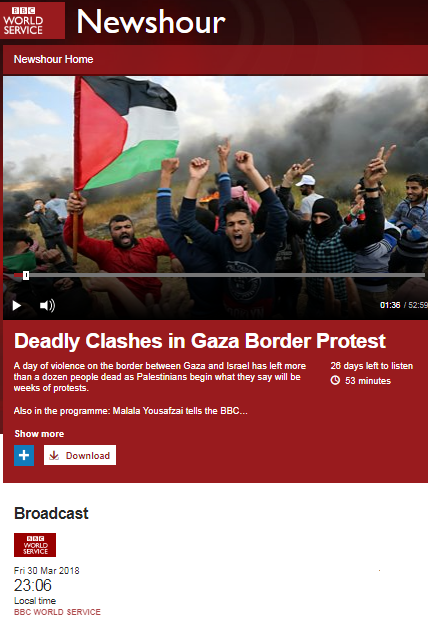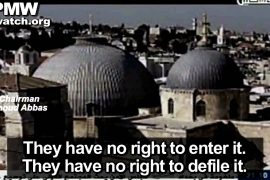In part one of this post we saw how listeners to BBC Radio 4 on March 30th heard a report about the violent rioting along the border between Israel and the Gaza Strip which included multiple references to the Palestinian demand for ‘right of return’ – without any background information or context on that issue being provided.
Listeners to the evening edition of the BBC World Service radio programme ‘Newshour‘ on the same day also heard reporting on the same events. Presenter Julian Marshall introduced the item (from 00:63 here) as follows: [emphasis in italics in the original, emphasis in bold added]
Marshall: “But we go first to the border between Israel and Gaza. Thousands of Palestinians massed today in what is the start of weeks of protest to demand that refugees be allowed to return to their homes in what is now Israel. The protesters had been told by the organisers – among them Hamas – to be peaceful and not to approach the border fence but stones and firebombs were thrown while the Israeli army responded with tear gas and live fire. And at day’s end 15 demonstrators have been killed and hundreds injured.”
Without clarifying to listeners that the people he described as refugees are in fact descendants of refugees – and why – and without reminding audiences that the Gaza Strip has not been ‘occupied’ for thirteen years, Marshall went on to present some voice-over translations of anonymous speakers – the first of which had also been heard by listeners to BBC Radio 4.
Marshall: “Here are some Palestinian voices on the border.”
V/O Man 1: “We need to change the way we deal with the Israeli occupation. Every peaceful and non-peaceful way has failed. We must find a way to go back to our homeland. It’s been 100 years now and Palestinians are stranded while all the other nations of the world are enjoying peace and democracy.”
V/O Man 2: “Did you see all those who got injured today? We are staying put until we get back our land. I hope we sent a clear message today. What could happen to us more than that? We’re besieged, beaten and have been suffering for so long.”
V/O Woman 1: “This is a peaceful rally. We are here to tell the world that returning to our land is non-negotiable. We will return to our cities.”
As made clear in Marshall’s introduction and as the showcased “Palestinian voices” further indicate, the programme’s producers are obviously aware of the fact that the publicity stunt dubbed ‘the Great Return March’ rests on the issue of the Palestinian demand for ‘right of return’.
Clearly in order for listeners to be able to reach an informed opinion on that topic, they should have been made aware of the fact that the aim of that demand is in to eradicate the Jewish state and that it is incompatible with the internationally accepted ‘two-state solution’ to the Israeli-Palestinian conflict.
Obviously audiences would also have benefited from hearing some context regarding the circumstances under which some of the Arabs living in the area in 1948 became refugees – and not least the fact that the process began because neighbouring Arab states chose to initiate a war intended to eradicate the emerging Jewish state.
Marshall however supplied no such information before going on to interview former IDF spokesperson Avital Leibovich about the day’s violent incidents on the border. At 07:43 he introduced his next interviewee – a member of the Hamas terror group that co-organised this stunt precisely in order to get such media exposure.
Marshall: “So what does Hamas make of the allegations by Israel that the violence started on the Palestinian side? The protests have been taking place at a number of locations along the border between Israel and Gaza and at one of those, near Malaka, we contacted Ahmed Yousef – a former senior advisor to the leader of Hamas, Ismail Haniyeh.”
Interestingly, in a 2008 interview with the German newspaper Der Spiegel, Yousef described plans similar to the ‘Great Return March’ now underway.
“Ahmed Yousef would like to pull off another Rafah-style exploit, but this time against the Palestinians’ archenemy, Israel. He is planning a mass march to the Erez border crossing in northern Gaza. “We’re going to send half a million people there, mainly women and children. Then we’ll see how the Israelis react,” he says. A devilish scheme, since the Israelis would not react as passively to the storming of their border as the Egyptians did. But Yousef is not impressed by such objections. “If the Israelis want our blood, I’m willing to sacrifice my children.”
Yousef has already asked international observers to participate in the “march on Erez.” Some have already agreed to come, and Yousef is happy about this. “This,” he says, “is the beginning of the third Intifada.””
Listeners heard Yousef deny seeing anyone approaching the border fence or “firing anything” and dismiss such reports as “what the Israeli try just to justify their aggression and the way of killing people and shooting on them”.
Yousef: “But from my observation I didn’t see any of these accusations or these Israeli lies against the people here. They enjoy actually to sit and talk and sing to show the whole world that we, as Palestinian, as refugee, we are close to our border and we hope that the message received will be received by the world community.”
In response to a question from Marshall about Hamas’ funding of the event Yousef claimed:
Yousef: “This all nonsense. This is the Israeli hasbara, the propaganda machine trying to undermine the people’s spirit. That why everybody brought his family with him and come to show that those grandchildren and their sons and daughters continue that kind of commitment towards their land. Their land is across the border and everybody try to inherit this vision for his family.”
Replying to a question from Marshall about the possibility of a “rethink” of tactics, Yousef made references to a non-existent “siege” and inaccurately implied that Israel is to blame for poor medical services in the Gaza Strip. Julian Marshall made no attempt whatsoever to challenge those falsehoods.
Yousef: “You know that actually it is every day we have people who are – because of the sanction, because of Gaza being under siege – died from different diseases because they can’t get the medical treatment. Or the people are suffering because there is no enough job or work and so you are suffering by any means. You are [in] hell and now the time for the message to cross to the world community that there are, there were people here in Gaza who still suffering from the siege and also they are willing to push the world community to implement United Nations resolution 194 where people should return to their towns and cities and being compensated. So this is the message that the people trying to send and this is the only message.”
Listeners would of course have benefitted at that point had they been informed that UN GA resolution 194 is a non-binding resolution dating from December 1948 that was opposed at the time by Arab states and which (despite long-standing BBC claims to that effect) does not specifically relate to Palestinian refugees and – contrary to often heard assertions – does not grant any unconditional ‘right of return’.
However Marshall instead provided Yousef with a platform from which to downplay Hamas involvement in the organisation of the ‘Great Return March’ before closing the interview.
Yousef: “But you know most of the people who been actually organise this Great March are youth. They don’t rely on political factions.”
As we have seen in the two examples in this post, the BBC has provided Hamas and some of the publicity stunt’s other organisers with exactly the type of unchallenging media platform that they counted on being given. Concurrently however, the BBC has refrained from providing its audiences with the background information on the Palestinian maximalist demand for the ‘right of return’ that is essential for proper understanding of this latest Hamas agitprop.
Related Articles:
Hamas agitprop requires BBC journalists to brush up on UN resolution
British connections to upcoming Gaza agitprop ignored by BBC News
BBC News claims Gaza stone throwers engaged in ‘peaceful demonstrations’
BBC again fails to adequately clarify Hamas’ role in Gaza border agitprop
BBC radio portrayal of the ‘right of return’ – part one




